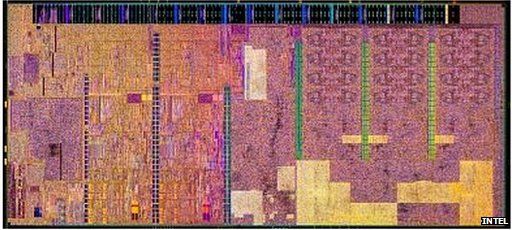
-
16 July 2015
- From the section Technology

Intel has delayed changes to its factories that would have made its chips faster and more powerful.
It said it had hit problems upgrading its fabrication systems so they could manufacture components that were only 10nm (nanometres) in size.
Instead, Intel said, it would seek to boost processor performance by different means.
The news comes days after IBM said it had solved problems that would have stopped it using smaller components.
Stop the clock
The delay was revealed by Intel boss Brian Krzanich during a conference call with the press and financial analysts.
“The lithography is continuing to get more difficult as you try and scale, and the number of multi-pattern steps you have to do is increasing,” he said.
On the current generation of chips emerging from Intel factories, the smallest parts are about 14 nm in size.
Originally, Intel said these would be phased out in favour of the 10nm chips this year. Now, it said, 10nm chips may not appear before 2017.
The delay will derail the two-step “tick tock” system it has been using for years to steadily improve processor power.
This process alternates changes to the gross layout of a chip (tock) with refinements to fabrication of individual components (tick).
Mr Krzanich did not elaborate on what would drive the improved number-crunching power of the 14nm chips it will be producing instead of the processors built around 10nm components.
Intel’s admission could be a signal that Moore’s law – which defines the steady year-on-year improvement in processor power – could be coming to an end.
When first formulated by Intel co-founder Gordon Moore 50 years ago, this suggested that chip power could double every 12 months.
Often, this improvement comes about by shrinking the millions of transistors on a chip.
Since then, the law’s estimate of how long it would take to refine production systems to make it economic to produce faster chips has stretched.
Now, improvements are expected approximately every 24 months.
Last week, IBM announced that it had found ways to reliably produce chips that had 10nm components.
However, it said, these techniques had so far only been shown to work in the laboratory and not in large-scale chip fabrication plants.
